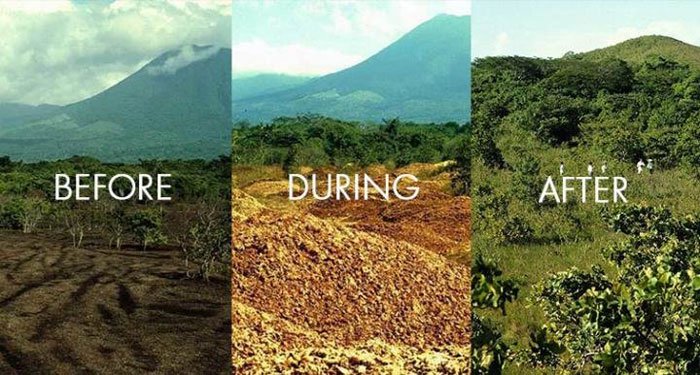 Did you know that orange peels take six months to decompose? If you don’t compost, those remnants of your healthy snack pile up in a landfill.
Did you know that orange peels take six months to decompose? If you don’t compost, those remnants of your healthy snack pile up in a landfill.
Now imagine how much waste large juice companies produce, with 64 oranges per 128 oz. bottle!
A one-of-a-kind experiment in Costa Rica has turned a barren patch of land into a thriving jungle, in what researchers consider a miracle.
What Is Composting?
Composting is the process by which organic matter decomposes to produce a rich soil called hummus. Not only does composting replenish nutrients in your garden or yard, it helps soil hold more carbon dioxide and decreases methane gas emissions.
The quality of the composted soil is important because both methane and carbon dioxide are greenhouse gases. A greenhouse gas traps heat and radiation resulting in an increase in our earth's temperature. Composting helps to prevent this because matter decomposes aerobically (using oxygen). This prevents the production of methane, unlike landfills that are responsible for 20% of methane emissions.
The Costa Rica Experiment

In 1997, the Guanacaste National Park was scattered with barren patches of land. Princeton researchers, Daniel Janzen and Winnie Hallwachs, took a unique approach to restore these patches. They reached out to a Costa Rican juice company, Del Oro, to make a deal with the Guanacaste National Park. If Del Oro was to donate a portion of their land to the park, they would be permitted to dump their orange peel waste on national park lands, free of charge.
After six months and more than 1,000 truckloads (26 million pounds!) of peels, the status of the land was promising. As the orange peels decomposed, they produced a dark, thick soil. However, the project was quickly opposed by the juice company, TicoFruit, and the Supreme Court decided to shut the project down.
Sixteen years later, in 2013, Princeton ecologist Timothy Treuer took a visit to Costa Rica to look for the barren patches. The only issue -- he couldn't find it! A few years later, when Treuer finally located the sign marking the site, he found a huge jungle covering more than five football fields worth of land. This greenery included a fig tree with a circumference three times a human's arm span, and represented a 176% increase in above ground growth!
How Can You Help?
Researchers hope that the astounding results of this project will encourage others to try similar conservation projects. Even, if you don’t have 26 million pounds of orange peels, you can utilize the waste in your household to decrease greenhouse gas emissions and supply your garden or backyard with a heaping helping of nutrients.







